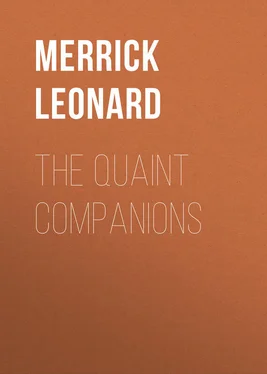Leonard Merrick - The Quaint Companions
Здесь есть возможность читать онлайн «Leonard Merrick - The Quaint Companions» — ознакомительный отрывок электронной книги совершенно бесплатно, а после прочтения отрывка купить полную версию. В некоторых случаях можно слушать аудио, скачать через торрент в формате fb2 и присутствует краткое содержание. Жанр: foreign_antique, foreign_prose, на английском языке. Описание произведения, (предисловие) а так же отзывы посетителей доступны на портале библиотеки ЛибКат.
- Название:The Quaint Companions
- Автор:
- Жанр:
- Год:неизвестен
- ISBN:нет данных
- Рейтинг книги:3 / 5. Голосов: 1
-
Избранное:Добавить в избранное
- Отзывы:
-
Ваша оценка:
- 60
- 1
- 2
- 3
- 4
- 5
The Quaint Companions: краткое содержание, описание и аннотация
Предлагаем к чтению аннотацию, описание, краткое содержание или предисловие (зависит от того, что написал сам автор книги «The Quaint Companions»). Если вы не нашли необходимую информацию о книге — напишите в комментариях, мы постараемся отыскать её.
The Quaint Companions — читать онлайн ознакомительный отрывок
Ниже представлен текст книги, разбитый по страницам. Система сохранения места последней прочитанной страницы, позволяет с удобством читать онлайн бесплатно книгу «The Quaint Companions», без необходимости каждый раз заново искать на чём Вы остановились. Поставьте закладку, и сможете в любой момент перейти на страницу, на которой закончили чтение.
Интервал:
Закладка:
He remained for about a quarter of an hour, and as soon as he had gone she took the slippers off, and spread her feet on the hearth in comfort.
At half-past six the deferential waiter appeared again, accompanied by another – mute, but seeming to deprecate by his shoulders the liberty of moving on the same planet with her. For the first time in her experience she dined. Perhaps, because she was a woman, the appointments impressed her more than the cuisine, but she appreciated the menu too. She enjoyed the oysters, the strange dark red soup, the sole with prawns and little mushrooms and things on the top; she liked the bird, and the pink frilled cutlets with a wonderful sauce, the omelette in blue flames, the silver bowl of strawberries and cream inserted in a block of ice. The resplendent sweet, representing a castle, and glowing with multi-coloured lights, astonished her, and the wines that flowed into the glasses stole through her veins deliciously.
She had not long set down her coffee-cup when she was informed that the brougham was at the door. She left the tiny flagons of liqueurs untouched, and ran back to the bedroom, to grimace at her toilette, and dip her puff in the powder again. In the brougham she felt even more opulent than she had done when Lee was beside her in it; she felt almost as if it were her own. She wrapped the rug about her knees, and looked out luxuriously at the gaslit streets. Soon all the traffic of London seemed to converge; the flash of carriage-lamps and the clatter of hoofs surrounded her. Into the cheaper parts of the Hall, the long black files of patient music-lovers still pressed forward. Her demeanour was haughty as she was shown to her box. To her first glance the great building seemed already full, but a thin stream of white-breasted women and shirt-fronts trickled continuously down the red stairway to the stalls. A certain exultation possessed her; they were all here to hear him – the man who was in love with her.
Somebody climbed to the great organ. His name was unfamiliar to her, and she did not know what the title of the piece meant. He juggled with the stops, and flooded the house with a composition in E flat. She cared little for the organ; it reminded her too strongly of church. She was relieved when he finished. A lady sailed on to the platform and warbled something of Schumann's. Was it a fact that she could not afford her dress? How beautifully it was made! She retired amid loud applause, her finger-tips supported by a gentleman whose functions suggested the ring-master at a circus. She was recalled, and bowed deeply three times, and tripped off with the ring-master once more. A popular baritone received an "encore." A lady violinist had painfully thin arms. Ownie glanced at the programme again – yes, the next name was "Mr. Elisha Lee." The faces in the serried tiers of the vast dome seemed to crane a little; a wave of expectation stirred the throng. There was a long pause before he came.
He bore himself loftily – that was her first thought. The slow, measured steps that he had been taught to make added to his height; the conventional costume, in which his native predilections found no scope, became him well. The unsightly hands were gloved; only his black features and frizzy hair marred the dignity of the man as he stood before the hushed audience, during the opening bars on the piano. He raised his head – the music that he held vibrated for an instant; and then from the nigger's mouth – out over the breathless stalls, mounting high and mounting higher to the back of the far massed gallery – there seemed to float God's Voice. And now nobody remembered that the features were black; and no man among the thousands knew what message the voice was bringing to the heart beside him, for to all there was a different message that the poet had never told. Men tightened their lips to hide their tremors; the jewels on the women's breasts rose faster. Among the hot, tense crowd that strained over the topmost railings, was heard the sobbing of a little child – but only one soul heard it, and the child would have been a woman then if she had lived.
The music was lowered – his arms falling in studied curves to his sides, gave the signal for applause; there was the moment's silence that was so sweet to him. He bowed, and drew a step back. The audience recovered itself; the thunders broke. She saw fashionable women beating their hands together frantically; the roar recalled him again and again. He responded, and retired with a glance at Ownie. Her eyes were moist, and she shivered a little. She was not an emotional woman, but she was a vain one.
In Part II. he sang early, to conform with her arrangements, and they drove to Victoria, where the valet was waiting with her trunk. Lee guided her to a first-class compartment, and she congratulated herself on her forethought in having taken only a "third single" at Brighton. She observed, though she betrayed no consciousness of the fact, that the guard turned his key in the door after the foot-warmers were put in.
"And so," asked Lee for the second time, "you were satisfied with me?" His desire to flatter her was inordinate, but it wasn't responsible for the question: he was only thirsting to be praised.
"I felt as if I had never heard you sing before," she said; "I felt as if I had never heard anybody sing. You thrilled me. You have given me a day I shall remember all my life; it was perfect from beginning to end."
"I should like to give you many such days," he blurted.
"Ah!" She smiled – the faint, appealing smile that had always been so effective with Harris before he married her. "I'm afraid that isn't possible; I must think of this one instead."
Her heart throbbed heavily at her boldness. Even now she was not sure what answer she meant to make; why was she encouraging him to ask the question?
But though he had promised himself to ask it on the journey, Lee hesitated. The question surged to his throat, and swelled immensely and stuck there. A great timidity was on the nigger who had just swaggered before a multitude. The man's heart throbbed heavily at his cowardice.
He leant forward, and tucked the rug round her. He was rather a long time tucking the rug round her. "Is that better?" he muttered. "You're not cold?"
"Thank you. No, I'm as warm as can be. Oughtn't you to keep your wrap round your neck?"
"Not in here," he said; "I'll put it on again at the other end. Sunset is the worst time for me, too – not night."
"That's funny."
"I believe it's the worst time for all singers."
The velocity of the train seemed to him phenomenal, and a sudden misgiving seized him about the second door: somebody might intrude on them at the first stoppage, in spite of the tip. The minutes flew, and in every flashing bank and tree he saw a danger-signal.
"Why?" he said at last.
"'Why'?" She was at a loss.
"Why isn't it possible for you to have other days just as good?"
He was terribly black – she averted her face before she spoke:
"How can I?" she murmured.
"I love you," he said huskily.
She had no words. He got up, and sat beside her. She felt his hand groping for hers under the rug, and trembled. Should she let him take it?.. He was holding it. "Do I frighten you?" She shook her head. "I'd give my life for you!" he cried. "Oh, if you can like me a little, only a little, I'll be so good to you! You shall never be sorry – I'll give you everything you want. I love you; I sang to you to-night. No white man could adore you as I do. Can't you – can't you forget the difference? It's cruel to me. No, no, not cruel; you could never be cruel; I know, I know, it's natural you can't understand – you fill my soul, but you can see no deeper than my skin."
"I do like you," her voice made answer.
"Will you be my wife?"
Читать дальшеИнтервал:
Закладка:
Похожие книги на «The Quaint Companions»
Представляем Вашему вниманию похожие книги на «The Quaint Companions» списком для выбора. Мы отобрали схожую по названию и смыслу литературу в надежде предоставить читателям больше вариантов отыскать новые, интересные, ещё непрочитанные произведения.
Обсуждение, отзывы о книге «The Quaint Companions» и просто собственные мнения читателей. Оставьте ваши комментарии, напишите, что Вы думаете о произведении, его смысле или главных героях. Укажите что конкретно понравилось, а что нет, и почему Вы так считаете.












